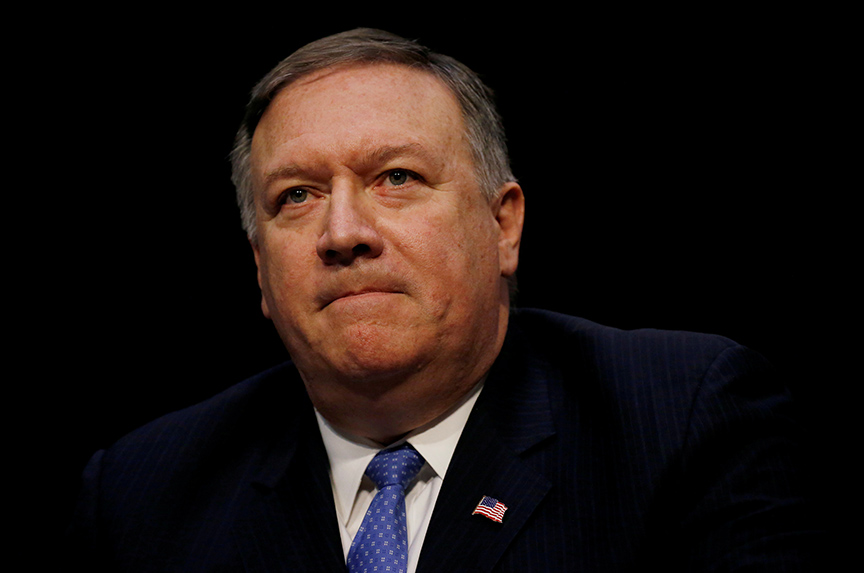 The remarkable news that CIA Director and US Secretary of State nominee Mike Pompeo made a secret trip to North Korea where he met North Korean dictator Kim Jong-un is a measure both of the head-spinning pace of diplomacy on the Korean Peninsula and of the seriousness with which US President Donald J. Trump’s administration takes the upcoming Trump-Kim summit.
The remarkable news that CIA Director and US Secretary of State nominee Mike Pompeo made a secret trip to North Korea where he met North Korean dictator Kim Jong-un is a measure both of the head-spinning pace of diplomacy on the Korean Peninsula and of the seriousness with which US President Donald J. Trump’s administration takes the upcoming Trump-Kim summit.
Trump has made solving the North Korea nuclear problem a centerpiece of his foreign policy. North Korea has posed a vexing dilemma the answer to which has eluded four US presidents—from George H.W. Bush through to Barack Obama—over the past quarter century.
A combination of unprecedented comprehensive economic sanctions that are starting to bite, pressure from China, fear of Trump’s threats of military action, and a relatively friendly leftist government in Seoul appears to have—at least for now—silenced Kim’s ballistic missile and nuclear tests. In fact, Kim has stopped boasting about how North Korea is a nuclear state and has instead ramped up dialogue with both South Korea and the United States on peace and denuclearization.
Pompeo’s trip was not quite as strange as it might at first appear. The United States has for more than a decade had an intelligence “backchannel” to Pyongyang. US officials have met from time to time with senior North Korean officials. Pompeo’s trip was historic not just because he met with Kim, but as it involved planning for an even more historic event—the Trump-Kim summit.
There is a rich menu of issues to be resolved starting from where (five cities in Europe and Asia are being considered) and when to hold the summit, to logistical details, and, most importantly, the agenda, which has become entangled with that of a separate summit between Kim and South Korean President Moon Jae-in on April 27.
The Trump administration’s priority is dismantling North Korea’s nuclear weapons and denuclearization of the Korean Peninsula. It is unclear what Pyongyang wants in return. Based on past negotiations, it is likely to be whatever North Korea defines as “removing the US threat” (possibly the withdrawal of US troops from South Korea), security guarantees, a peace treaty, US-North Korea normalization, and some economic benefits.
The Trump-Kim summit has been made more complicated by the fact that in planning for the North-South summit Seoul has said that the two sides will discuss a peace treaty to formally end the 1950-53 war. Technically, the two Koreas are still at war. A truce and an armistice, but not a peace treaty, have been in place since 1953. Trump has given the two Koreas his “blessing to discuss the end of the war.”
Like the Trump-Kim summit itself, this talk of a peace treaty turns diplomacy upside down. Summits and peace treaties usually come toward the end of diplomatic negotiations. It is a bit like both Washington and Seoul have decided they want dessert before they have even had an appetizer.
But these are complex issues. What does a peace treaty mean when both sides remain armed to the teeth and there are 28,000 US troops in South Korea? What value is a piece of paper, like another 1928 Kellogg-Briand Pact that renounced the use of war, that simply declares peace without taking the difficult steps to end confrontation as the United States and the Soviet Union did at the end of the Cold War? Or is this a peace process based on an agreement on mutual force reductions and dismantling Pyongyang’s ballistic missiles that have Seoul and Tokyo within range? According to South Korean press reports, Seoul is negotiating an announcement “to ease military tensions and end a military confrontation.”
Along with the two Koreas, the United States and China are signatories to the armistice. But to sign a peace treaty with North Korea, the United States would need to first have diplomatic relations with Pyongyang.
One hopes that Pompeo is navigating his way through this thicket of issues and that the Trump administration is developing a game plan for not just the Trump-Kim summit, but also the hard negotiations that will undoubtedly follow.
Pompeo’s secret diplomacy appears to have assuaged many critics uncomfortable with his hawkish foreign policy views. This may well ease his path to confirmation as secretary of state. But looking at these difficult issues and a troubling track record of failure to reach and implement nuclear deals with North Korea, I cannot help but think of Murphy’s Law (Whatever can go wrong, will go wrong). In any case, North Korea will be the ultimate test for Pompeo and Trump’s foreign policy.
Robert A. Manning is a senior fellow in the Atlantic Council’s Scowcroft Center for Strategy and Security. Follow him on Twitter @Rmanning4.
Image: Central Intelligence Agency (CIA) Director and US Secretary of State nominee Mike Pompeo made a secret trip to North Korea over the Easter weekend and met North Korean leader Kim Jong-un. (Reuters/Leah Millis)
